江西省南昌市湾里区第一中学人教版高中英语必修5:Unit 1 Great Scientists Warming up and Reading 课件(共81张PPT)
文档属性
| 名称 | 江西省南昌市湾里区第一中学人教版高中英语必修5:Unit 1 Great Scientists Warming up and Reading 课件(共81张PPT) | 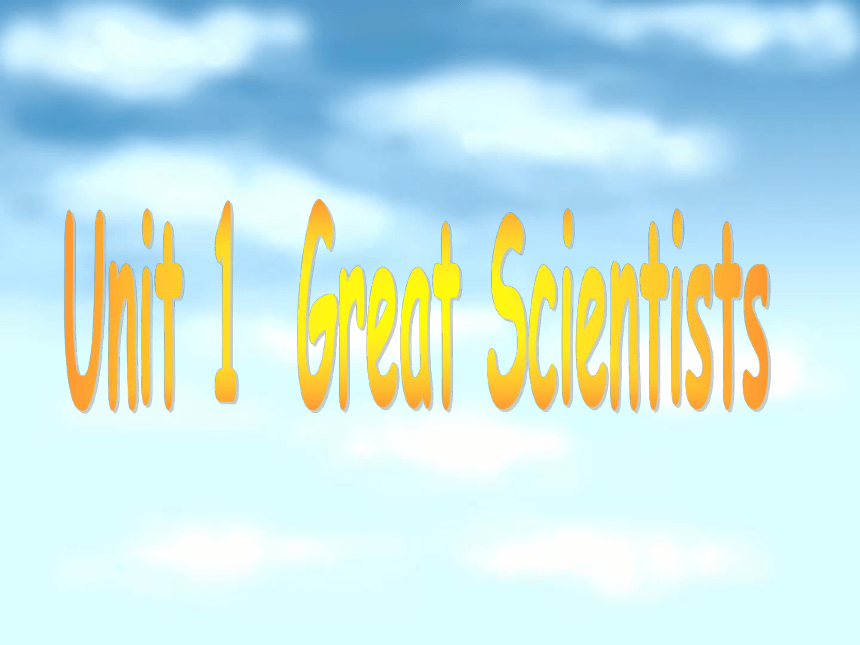 | |
| 格式 | zip | ||
| 文件大小 | 2.0MB | ||
| 资源类型 | 教案 | ||
| 版本资源 | 人教版(新课程标准) | ||
| 科目 | 英语 | ||
| 更新时间 | 2015-06-08 18:13:54 | ||
图片预览

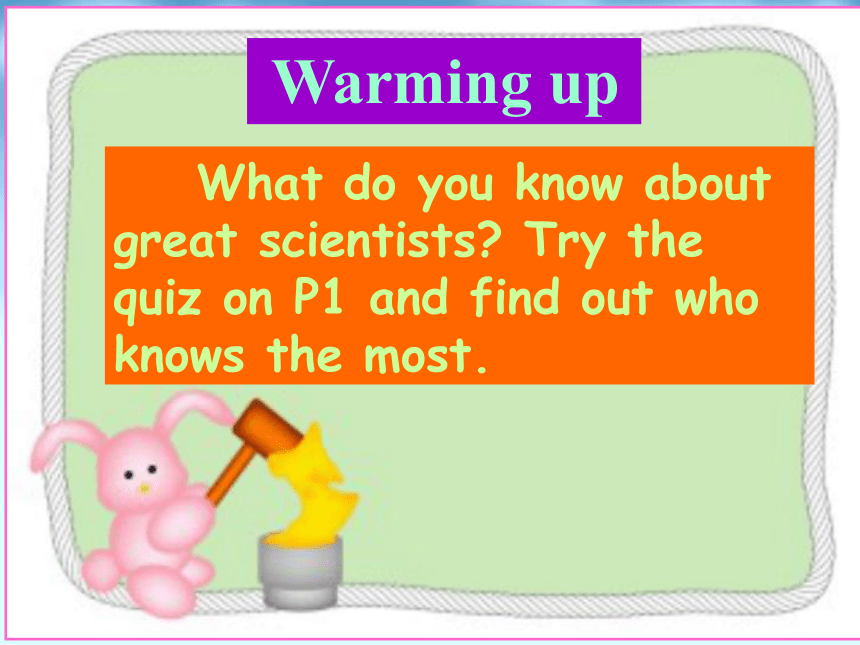
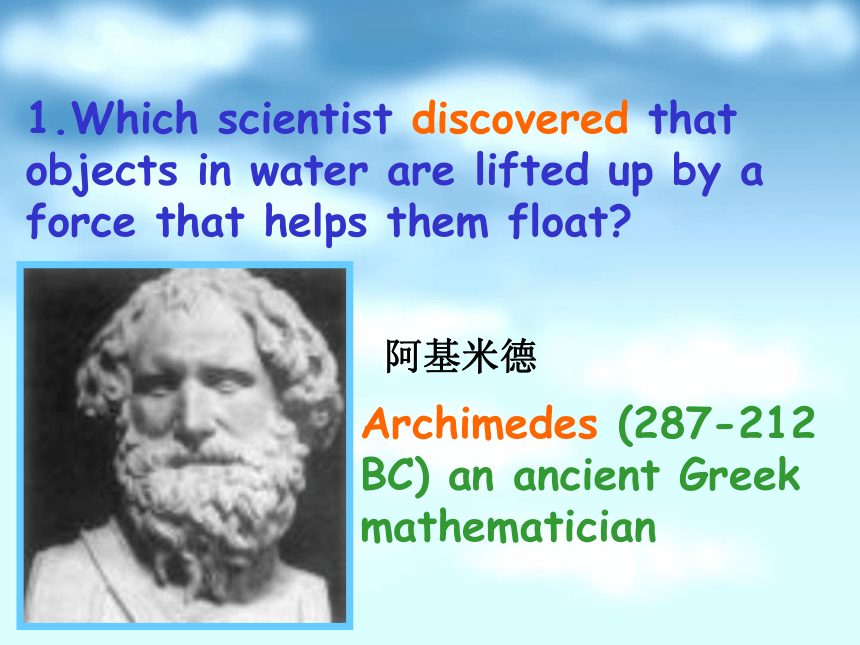
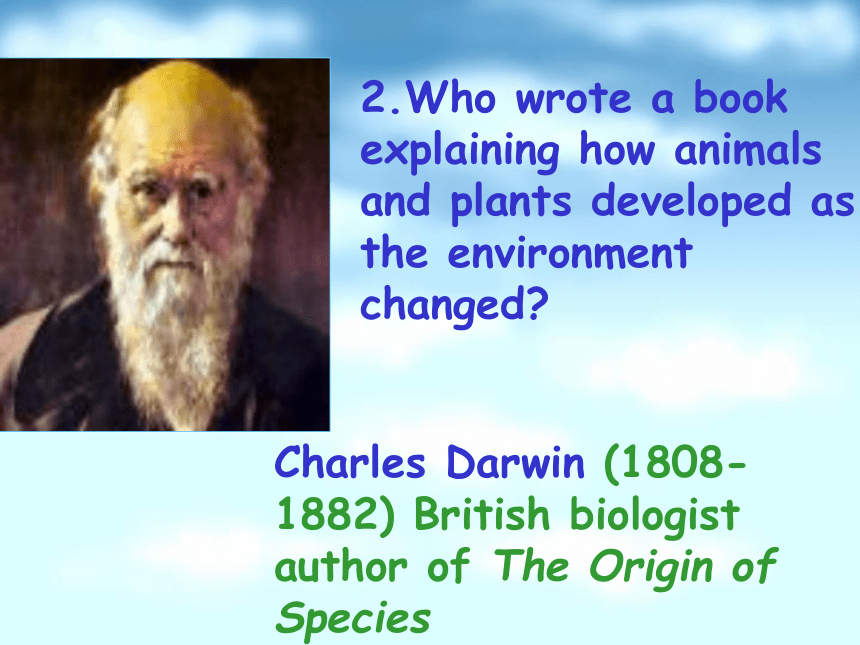
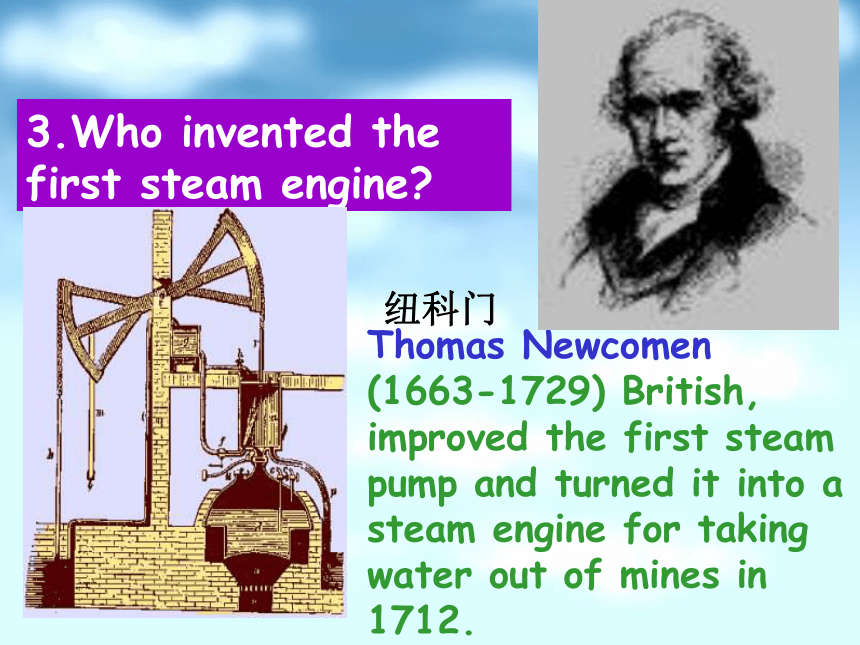
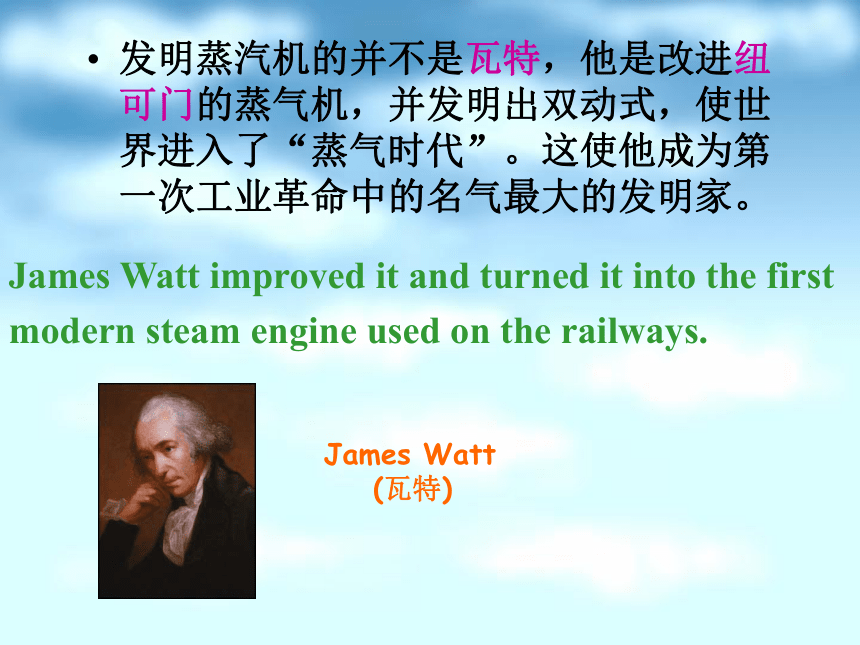
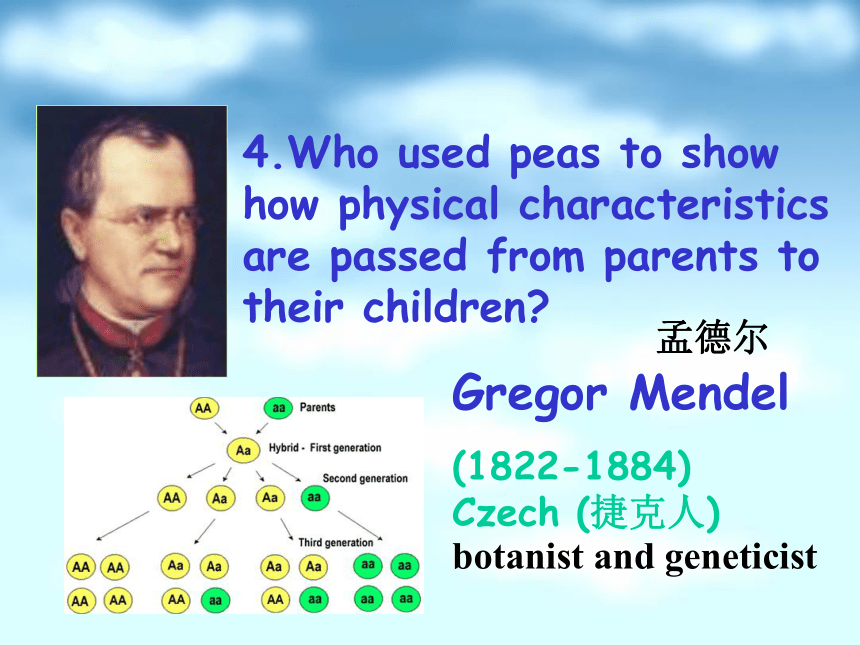
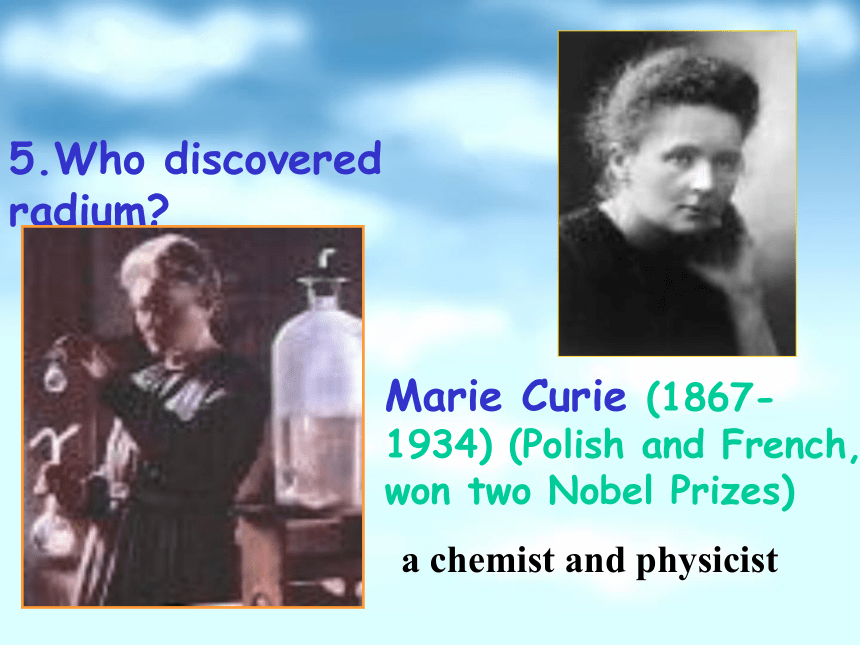
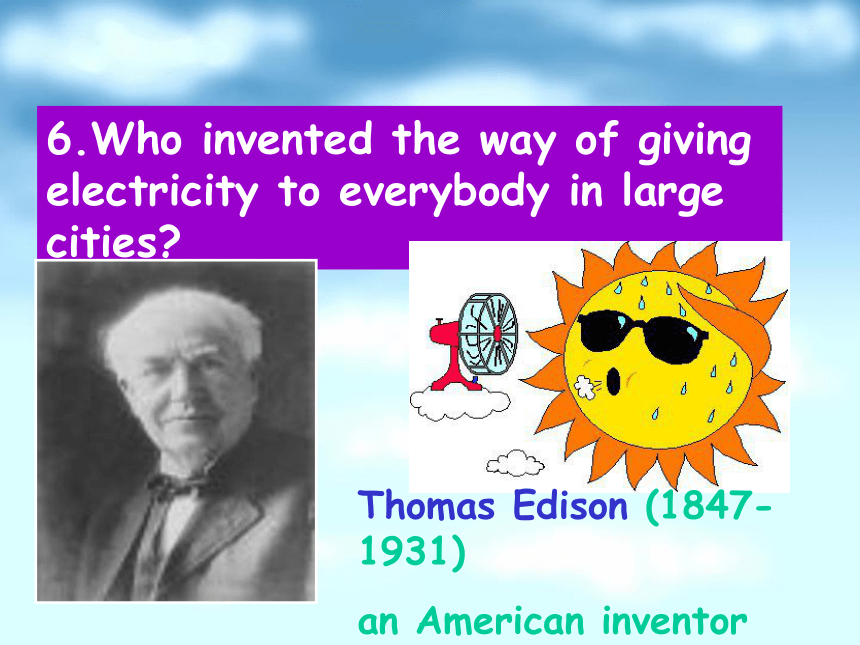
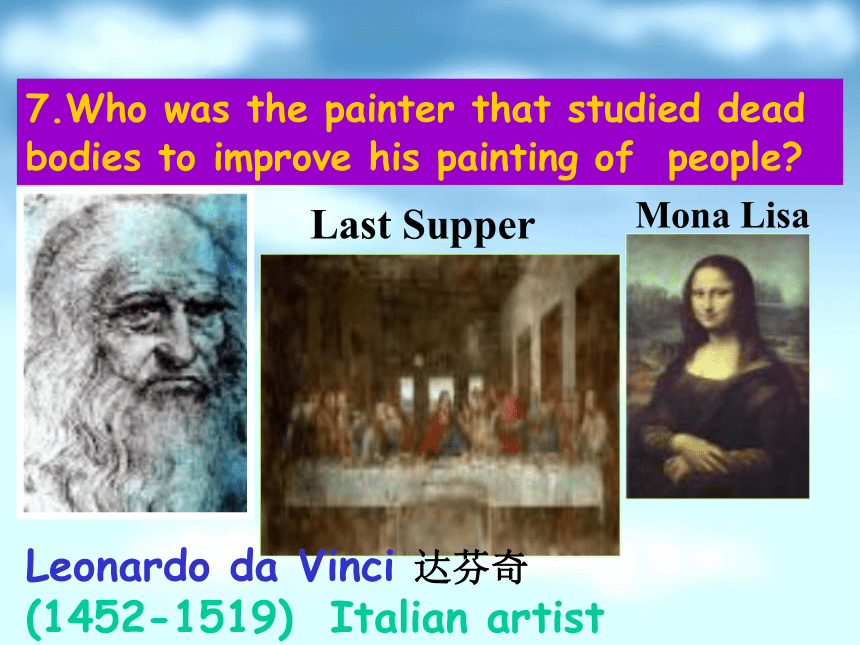
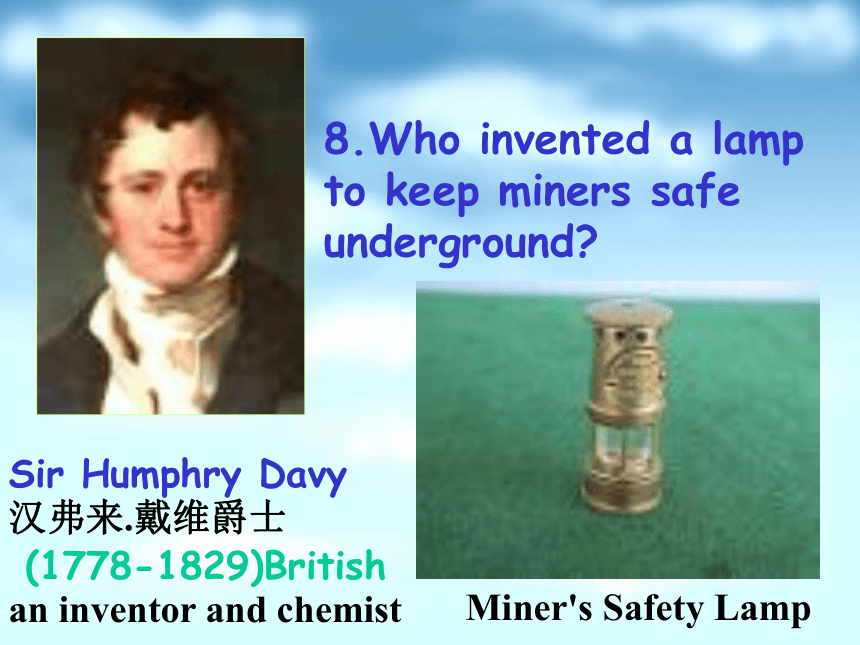
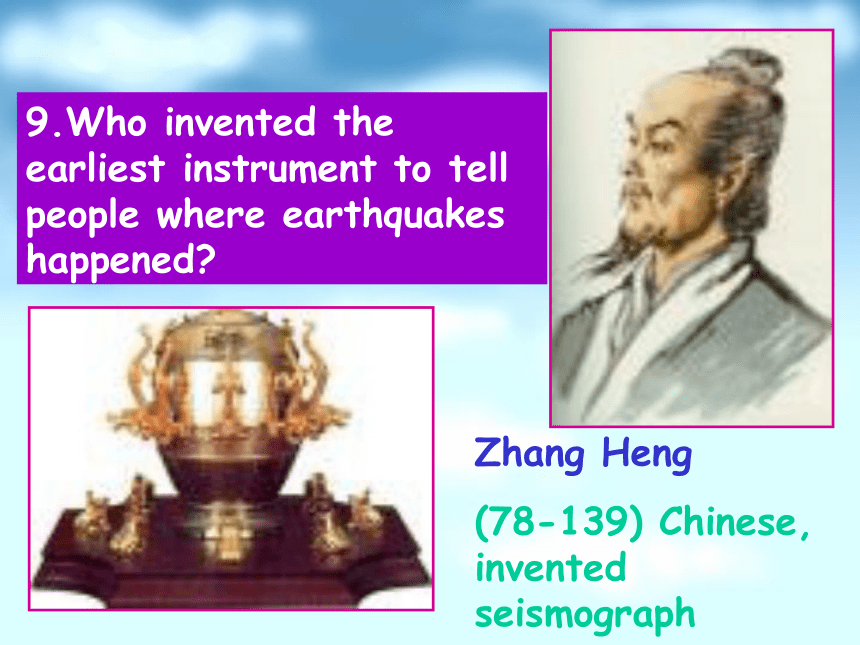
文档简介
课件81张PPT。Unit 1 Great Scientists What do you know about great scientists? Try the quiz on P1 and find out who knows the most. Warming up1.Which scientist discovered that objects in water are lifted up by a force that helps them float?Archimedes (287-212 BC) an ancient Greek mathematician阿基米德 2.Who wrote a book explaining how animals and plants developed as the environment changed?Charles Darwin (1808-1882) British biologist
author of The Origin of Species 3.Who invented the first steam engine?Thomas Newcomen (1663-1729) British, improved the first steam pump and turned it into a steam engine for taking water out of mines in 1712. 纽科门 发明蒸汽机的并不是瓦特,他是改进纽可门的蒸气机,并发明出双动式,使世界进入了“蒸气时代”。这使他成为第一次工业革命中的名气最大的发明家。
James Watt
(瓦特)James Watt improved it and turned it into the first
modern steam engine used on the railways. 4.Who used peas to show how physical characteristics are passed from parents to their children?Gregor Mendel
(1822-1884) Czech (捷克人) botanist and geneticist孟德尔 5.Who discovered radium?Marie Curie (1867-1934) (Polish and French, won two Nobel Prizes)
a chemist and physicist6.Who invented the way of giving electricity to everybody in large cities?Thomas Edison (1847-1931)
an American inventor7.Who was the painter that studied dead bodies to improve his painting of people? Last SupperMona LisaLeonardo da Vinci 达芬奇
(1452-1519) Italian artist8.Who invented a lamp to keep miners safe underground?Sir Humphry Davy
汉弗来.戴维爵士
(1778-1829)British
an inventor and chemistMiner's Safety Lamp 9.Who invented the earliest instrument to tell people where earthquakes happened?Zhang Heng
(78-139) Chinese, invented seismograph10.Who put forward a theory about black holes?Stephen Hawking
(1942--) a British astronomer and physicistCarl?LinnaeusCarl Linnaeus (1707–1778) lived and worked in Sweden. He succeeded in classifying kinds of plants and animals. His classification has proved very successful and is still used today. Listen to the tape once and tell what this listening passage is about.
This is about a man who wants to name a flower.
This is about a man who finds a flower and wants to own it.
This is about a man who finds a flower and wants to know if it is a new species of flower.CListen to the tape twice and fill in the blanks.Listening-II----filling (5m)specialistbookSweden1707 to 1778biologyyoung plants and animalsbabies eggsproduce seedsgroupseggsfeathersbirdparrotbird, parrotSweden1778biologyyoung plants and animalssort outbirdparrotSpeaking activityDiscuss in groups of four, which field do you want to contribute yourself to in the future? Speaking (3m)Pre-reading (pair discussion)
What five most important
qualities do you think a scientist
should have? Give reasons.
careful clever strict patient
creative strong-willed honest
serious intelligent humorous
ambitious generous
Unit 1 Great Scientists
(reading)Warming upWhat impress you most in 2003?Infectious diseases can be spread easily. They have an unknown cause and may do great harm to people.People could be exposed to infectious diseases, so may animals, such as bird flu.AIDS, SARS are infectious diseases. They are difficult to cure.What do you know about infectious diseases? Pre-readingWhat other infectious diseases do you know?For example: When you eat some seafood……You feel……Maybe you have got ________.CholeraWarming up----questions (2m)Bacteria of choleraDo you know what kind of disease is cholera?It is a kind of terrible disease caused by drinking dirty water and it caused a lot of deaths in the old times and it was very difficult to defeat.water pumpJohn Snow is a well-known doctor in the 19th century in London and he defeated “King Cholera”. ReadingLet’s get to know how Dr. John Snow defeated “King Cholera” in 1854 in London in this reading passage: John Snow Defeats “King Cholera”Task 2: Read and Answer1 Why couldn’t the cholera be under control at first?
2 Which theory did John Snow believe in?
3 Why is there no death at No. 20 and 21 Broad Street as well as at No. 8 and 9 Cambridge Street?
4. To prevent the cholera from spreading again, what did John Snow do?1 Why couldn’t the cholera be under control at first?
2 Which theory did John Snow believe in?
Neither its cause, nor its cure was understood.People absorbed cholera into their bodies with their meals.3.Why is there no death at No. 20 and 21 Broad Street as well as at No. 8 and 9 Cambridge Street?These families had not drunk the water from the Broad Street pump.4 To prevent the cholera from spreading again, what did John Snow do?
Suggested that the source of all water supplies be examined.
Suggested that new methods of dealing with polluted water be found.
Instructed the water companies not to expose people to the polluted water anymore.ComprehendingThe passage is written as a report of an experiment and there are 7 steps:1.Find a problem:(发现问题)
2.Make up a question:(形成研究主题)
3.Think of a method:(找出研究方法)
4.Collect results:(收集材料)
5.Analyse results:(分析材料)
6.Repeat if necessary:(必要时重新分析)
7.Draw a conclusion:(得出结论)Mind Map of the TextJohn Snow Defeats “King Cholera”Paragraph 1: Introduction of John Snow and Cholera
Paragraph 2: Two theories
Find a Problem:Make a question:Paragraph 3-5: Study of the breakout in 1854 What caused the cholera?
Which is right?Paragraph 3: Study of the breakout in 1854
Think of a method:
Collect the result:
Analyze the result:Paragraph 4: Study of the breakout in 1854
Paragraph 5: Study of the breakout in 1854
Analyze the result:Repeat if necessary:
Draw a conclusion:Test two theoriesMark the deathReason for death and no deathFind the resource of the waterFind more evidence.
Cholera was spread by germ
Polluted water carried choleraParagraph 6: Prevention of Cholera
John Snow defeats King CholeraNobody knew the cause of the serious disease of choleraa strange cloud of gas found its victimspeople absorbed the disease with mealsCollect information from the cholera outbreak to prove which theory was correctHe found the cause of cholera was the polluted waterIdea 2. Because the information showed that the dirty water carried choleraHe defeated cholera by examining the water supply and dealing with the polluted water Discussion: Discuss the following questions in groups of four.1.2.3.Cholera was a 19th century disease. What disease do you think is similar to cholera today?John Snow believed Idea 2 was right. How did he finally prove it?Do you think John Snow would have solved this problem with- out the map? Give a reason. Two diseases, which are similar today, are SARS and AIDS because they are both very serious, have an unknown cause and public health care to solve them. John Snow finally proved his idea because he found an outbreak that was clearly related to cholera, collected information and was able to tie cases outside the area to the polluted water.Keys1.2. No. The map helped John Snow organise his ideas. He was able to identify those households that had had many deaths and check their water-drinking habits. He identified those houses that had had no deaths and surveyed their drinking habits. The evidence clearly pointed to the polluted water being the cause.3.Read the passage again and fill in the blanks:
John Snow was a well-known ____ in London in the ___ century. He wanted to find the ______ of cholera in order to ______ it. In 1854 when a cholera ____ out, he began to gather information. He _____ on a map where all the dead people had lived and he found that many people who had drunk the dirty water from the ______ died. So he decided that the polluted water carried cholera. He suggested that the _____ of all water supply be _______ and new methods of ________ with polluted water be found. Finally, “King Cholera” was defeated.doctorcause19thdefeatbrokemarkedpumpsourceexamineddealingLanguage points for warming up 1. explain
explain sb. Sth.
explain sth. to sb .
2. characteristic n./adj.
Some genetic ~s are not obvious.
The two groups of children have quite different ~s.
Forgetfulness is often ~ of aged people.(T)(F)特有的,典型的 pass sth from… “从…处传来,传下“
pass by 路过,经过…
pass down 把…传下来
pass on 传递,传授1.The tradition is __________ their ancestors.
2. This spirit should be passed ______ from generation to generation.
3. Pass the letter ___ to the person next to you .
4. So many people pass ___ and never notice the change.passed fromdownonby3.Who invented the way of giving electricity to everybody in large cities?是谁发明了把电带给大城市中的每个人的办法?
the way of doing sth.= the way to do … “做…..的方法”
She showed us the way of cleaning it.= She showed us the way to clean it.她给我们示范清洗它的办法.
the way引导的定语从句的引导词有三种, 可以用that;可以用in which;还可以省略.
I don’t like the way _____________ you speak to your father.
我不喜欢你跟你父亲讲话的方式.
与way相关的短语:
by the way
by way of …
lose one’s way
no way
feel one’s way
on one’s way to…
in this way=by this means=with this method
(that/ in which)用这种方法顺便说通 过……的方法迷路(俚语) 没门,别想摸黑走,谨慎从事在去…的路上4.Who put forward a theory about black holes?谁提出了黑洞的理论?
put forward
(1) to offer (an idea, suggestion etc.) for consideration 提出(建议等)
(2)推荐某人或自己任职位;提名
我能否提名你当我们的班长?
May I put your name forward as our monitor?The match has been put forward to 1:30.
比赛已经提前到一点半举行。put away 抛弃;舍弃
put down 写下来;记入名单;
put on 穿上;戴上;增加
put off 耽误;延期
put out 熄灭(灯);扑灭 (火)
put up 建立;建造
put up with… 忍受……
You can take anything from the shelf and read, but please ______ the books when you’ve finished with them.
A. put on B. put down C. put back D. put off
conclude: v. 作结论,断定
The jury concluded that he was guilty.
陪审团认定他有罪。
to conclude: 总而言之,总之
To conclude, I want to thank you for your help.
conclusion: n. 结论得出结论arrive at
draw
come to}a conclusionCheck / examine
check 表示“检验,核对”(看是否正确,是否符合标准)
Let’s send the products to the head of the workshops to be ~ed.
examine 表示“仔细检查,以便发现。”
You’d better have your eyes ~d.
You have to ~ your bag when you enter a foreign country.defeat v./ n.
1.He defeated the champion in three sets.
2.His words completely defeated me.
3.The Party faces defeat in the election.Language points for reading I击败,战胜使困惑win / beat /defeat
win “赢得,获胜” ,后接奖品,奖金,名誉,财产
beat “击败,战胜” ,后接竞争队伍或者对手,敌人
defeat “击败,战胜” ,后接竞争队伍或者对手,敌人,(此用法同beat); 疾病等1.Mary _____ the first place in the competition.
2. Our school _______________ their school at football.
3. I ________________John at chess yesterday.
wonbeat / defeatedbeat / defeated1.John Snow was a well-known doctor in London---so famous, indeed that he attended Queen Victoria to ease the birth of her babies.约翰.斯诺曾经是一位著名的医生----他的确太富盛名了,以至于维多利亚女王生孩子时都是他去照料,帮助她顺利分娩.
attend v.
(1)to take care; give attention 注意,留意. 如:
We’ll attend to the solution of that problem later.
(2)to take good care of (a sick person, for example)照看,照料.如:医生照看病人.
The doctor attended (on / upon) the patients.(3)to be present at 出席,到场. 如:
attend school 上学
attend a lecture 听讲座
attend church 去教堂
attend (at) a wedding 出席婚礼 attend to
1.处理,办理
我有许多事情要处理。
2. 照顾,照料
先生,有人接待你吗?
Are you being attended to ?
If you go out, I’ll attend to the baby.
3. 专心,注意
If you don’t attend to the teacher,you’ll never learn anything.
attendance n. 照顾,出席I have some important things to attend to.2.But he became inspired when he thought about helping ordinary people exposed to cholera.exposed to cholera 在句子中是过去分词用作后置定语,表示被动.意为 “患霍乱的”.如:The book written by LuXun is very popular. 鲁迅写的书是很受欢迎的.昨天我们看见的那个人是史密斯先生.The man seen by us yesterday is Professor Smith.发散思维:
exposed adj. 暴露的,暴露于风雨中的,无掩蔽的
exposedness n. 暴露,显露开放思维: expose to 使易受,使受
expose sth to the light of day
把某事暴露于光天化日之下
expose a fraud
揭穿骗局Miles of sand are exposed at low tide.
2.The people of some Asian countries were exposed to the tsunami in 2004.
3. He exposed the crime to the police.
4. He exposed the plan to the newspsper.to uncoverto make suffer to make known3.This was the most deadly disease of its day.
die (v.) dead (adj.) death (n.) deadly adj.
(1).dangerous; likely to cause death 危险的;致命的
a deadly disease / weapon
(2). highly effective against sth. or someone 强有力的;致命的
a deadly remark 击中要害的评论(3). aiming to kill or destroy意在杀死的;不共戴天的:
a deadly enemy 不共戴天的敌人
adv.
(1). Very极度;非常;十分: deadly serious 十分认真
(2). like death 死一般地:
deadly pale 死一般苍白
4.So many thousands of terrified people died every time there was an outbreak.every time 在这里是连词,引导时间状语从句,意为“每次,每当”e.g. Every time I meet him, I always think of the things happened between us.每次见到他,我就想起发生在我们之间的事情。注意: immediately, the moment, directly, instantly 等与 every time一样,都可以用作连词引导时间状语从句,意为 “一…..就”。如:
I will give the letter to him immediately I see him.
我一见到他就把这封信给他。
I came directly I got your letter.
我一接到你的信就来了。
4.The second suggested that people absorbed this disease into their bodies with their meals .absorb…..into 吸收 如:e.g. The big company has gradually absorbed these small companies into its own organization. 这家大公司逐渐将这些小的公司吞并了。absorb v. (1)吸收(液体);
Water absorbs oxygen.(2) The clever boy absorbed all the knowledge his teacher could give him.
(3) The book absorbed his attention.
(4) The surrounding small towns have been absorbed into the city.理解,接受吸引(注意力, 兴趣等)使并入,吞并be ~ed in … 被…吸引;专心于;全神贯注于某事 如:
He is absorbed in his book.
The little girl was absorbed in reading a tale. 他发现在两条街道上霍乱流行的特别厉害,在十天之内就死去了五百多人。
5.He found that in two particular streets, the cholera outbreak was so severe that more than 500 people had died in 10 days.severe adj. (1)unsparing or harsh, as in treatment of others; strict 严厉的;苛刻的;严格的. 如:
The severe trainer has gone abroad. You can breathe freely again.
(2)causing sharp discomfort or distress; extremely violent or intense; very serious. 剧痛的,剧烈的,严重的,难熬的 如:
a severe attack of toothache.要求苛严的教官已经出国.你可以完全放心。 牙痛的剧烈发作。这张地图提供了一条说明霍乱起因的很有价值的线索。6. The map gave a valuable clue about the cause of the disease.valuable
(1)adj. worth of a lot of money
值钱的,贵重的 如:
The watch is valuable. 这表很值钱。
a valuable diamond. 贵重的钻石。(2) adj. having great usefulness or value 如:
valuable information
(3)n. (常用复数形式)sth that worth a lot of money. 如:
Cathy kept her valuables in a safe.重大的消息凯西把她的贵重物品藏在保险箱里.
7. It seemed the water was to blame.看来霍乱的流行要归罪于饮水了。be+动词不定式,可以表示该做或不该做的事情,相当于must, should, ought to 等。 如:No one is to leave this building without the permission of the police.
没有警察的允许谁也不准离开这栋楼。
You are not to drop litter in the park.
公园里不允许乱丢纸屑。受到责备,主动表被动8.Next,John Snow looked into the source of the water for these two streets.
其次,约翰.斯诺调查了这两条街的水源。look into 往…...里面看;to investigate 检查;了解。 如:
We’ll look into this matter together.
我们将一起调查这个问题。开放思维:
look on 观看,面向,旁观,看待
look out 面朝,留神,照料
look over 从上面看,察看,检查
look around 环顾,观光,察看
look through 看穿,审核,浏览,温习
look up and down 仔细打量,到处寻找
look after 寻求,照顾,关心9.In addition, he found two other deaths in another parts of London that were linked to the Broad Street outbreak.
除此之外,他发现在伦敦的另一个地方有两个死亡的病例与宽街爆发的霍乱有关联。in addition adv. as well as 另外 如:
I paid 100 Yuan in addition.
In addition to English, he has to study a second language. The teacher in addition to two students _______at the meeting.was6. Your composition is quite good
______several mistakes in spelling.
besides ? B. except ?
C. addition to? D. except for
7. I care for nothing ______
the one you bought for me yesterday.
in addition? B. as well as
C. besides? D. apart fromDD(1)besides
(2) except forlink…to... 把…与…连接;联系 如:
Fingerprints linked the suspect to the crime.
指纹证实了嫌疑犯的犯罪事实。
be linked to 连接 如:
The two towns are linked by a railway.10.With this extra evidence John Snow was able to announce with certainty that polluted water carried the disease.announce v. to make known publicly 如:
The captain announced that the plane was going to land.有了这个证据,约翰.斯诺就能够肯定的宣布,这种被污染的水携带病毒。机长宣布飞机就要着陆了。11.The first suggested that cholera multiplied in the air without reason.第一种看法是霍乱病毒在空气中无缘无故地繁殖着.(Suggest 用法参考P43.4,并完成相关的练习)
1.Finish the exercises on your book.
2.Review HomeworkThank you!
author of The Origin of Species 3.Who invented the first steam engine?Thomas Newcomen (1663-1729) British, improved the first steam pump and turned it into a steam engine for taking water out of mines in 1712. 纽科门 发明蒸汽机的并不是瓦特,他是改进纽可门的蒸气机,并发明出双动式,使世界进入了“蒸气时代”。这使他成为第一次工业革命中的名气最大的发明家。
James Watt
(瓦特)James Watt improved it and turned it into the first
modern steam engine used on the railways. 4.Who used peas to show how physical characteristics are passed from parents to their children?Gregor Mendel
(1822-1884) Czech (捷克人) botanist and geneticist孟德尔 5.Who discovered radium?Marie Curie (1867-1934) (Polish and French, won two Nobel Prizes)
a chemist and physicist6.Who invented the way of giving electricity to everybody in large cities?Thomas Edison (1847-1931)
an American inventor7.Who was the painter that studied dead bodies to improve his painting of people? Last SupperMona LisaLeonardo da Vinci 达芬奇
(1452-1519) Italian artist8.Who invented a lamp to keep miners safe underground?Sir Humphry Davy
汉弗来.戴维爵士
(1778-1829)British
an inventor and chemistMiner's Safety Lamp 9.Who invented the earliest instrument to tell people where earthquakes happened?Zhang Heng
(78-139) Chinese, invented seismograph10.Who put forward a theory about black holes?Stephen Hawking
(1942--) a British astronomer and physicistCarl?LinnaeusCarl Linnaeus (1707–1778) lived and worked in Sweden. He succeeded in classifying kinds of plants and animals. His classification has proved very successful and is still used today. Listen to the tape once and tell what this listening passage is about.
This is about a man who wants to name a flower.
This is about a man who finds a flower and wants to own it.
This is about a man who finds a flower and wants to know if it is a new species of flower.CListen to the tape twice and fill in the blanks.Listening-II----filling (5m)specialistbookSweden1707 to 1778biologyyoung plants and animalsbabies eggsproduce seedsgroupseggsfeathersbirdparrotbird, parrotSweden1778biologyyoung plants and animalssort outbirdparrotSpeaking activityDiscuss in groups of four, which field do you want to contribute yourself to in the future? Speaking (3m)Pre-reading (pair discussion)
What five most important
qualities do you think a scientist
should have? Give reasons.
careful clever strict patient
creative strong-willed honest
serious intelligent humorous
ambitious generous
Unit 1 Great Scientists
(reading)Warming upWhat impress you most in 2003?Infectious diseases can be spread easily. They have an unknown cause and may do great harm to people.People could be exposed to infectious diseases, so may animals, such as bird flu.AIDS, SARS are infectious diseases. They are difficult to cure.What do you know about infectious diseases? Pre-readingWhat other infectious diseases do you know?For example: When you eat some seafood……You feel……Maybe you have got ________.CholeraWarming up----questions (2m)Bacteria of choleraDo you know what kind of disease is cholera?It is a kind of terrible disease caused by drinking dirty water and it caused a lot of deaths in the old times and it was very difficult to defeat.water pumpJohn Snow is a well-known doctor in the 19th century in London and he defeated “King Cholera”. ReadingLet’s get to know how Dr. John Snow defeated “King Cholera” in 1854 in London in this reading passage: John Snow Defeats “King Cholera”Task 2: Read and Answer1 Why couldn’t the cholera be under control at first?
2 Which theory did John Snow believe in?
3 Why is there no death at No. 20 and 21 Broad Street as well as at No. 8 and 9 Cambridge Street?
4. To prevent the cholera from spreading again, what did John Snow do?1 Why couldn’t the cholera be under control at first?
2 Which theory did John Snow believe in?
Neither its cause, nor its cure was understood.People absorbed cholera into their bodies with their meals.3.Why is there no death at No. 20 and 21 Broad Street as well as at No. 8 and 9 Cambridge Street?These families had not drunk the water from the Broad Street pump.4 To prevent the cholera from spreading again, what did John Snow do?
Suggested that the source of all water supplies be examined.
Suggested that new methods of dealing with polluted water be found.
Instructed the water companies not to expose people to the polluted water anymore.ComprehendingThe passage is written as a report of an experiment and there are 7 steps:1.Find a problem:(发现问题)
2.Make up a question:(形成研究主题)
3.Think of a method:(找出研究方法)
4.Collect results:(收集材料)
5.Analyse results:(分析材料)
6.Repeat if necessary:(必要时重新分析)
7.Draw a conclusion:(得出结论)Mind Map of the TextJohn Snow Defeats “King Cholera”Paragraph 1: Introduction of John Snow and Cholera
Paragraph 2: Two theories
Find a Problem:Make a question:Paragraph 3-5: Study of the breakout in 1854 What caused the cholera?
Which is right?Paragraph 3: Study of the breakout in 1854
Think of a method:
Collect the result:
Analyze the result:Paragraph 4: Study of the breakout in 1854
Paragraph 5: Study of the breakout in 1854
Analyze the result:Repeat if necessary:
Draw a conclusion:Test two theoriesMark the deathReason for death and no deathFind the resource of the waterFind more evidence.
Cholera was spread by germ
Polluted water carried choleraParagraph 6: Prevention of Cholera
John Snow defeats King CholeraNobody knew the cause of the serious disease of choleraa strange cloud of gas found its victimspeople absorbed the disease with mealsCollect information from the cholera outbreak to prove which theory was correctHe found the cause of cholera was the polluted waterIdea 2. Because the information showed that the dirty water carried choleraHe defeated cholera by examining the water supply and dealing with the polluted water Discussion: Discuss the following questions in groups of four.1.2.3.Cholera was a 19th century disease. What disease do you think is similar to cholera today?John Snow believed Idea 2 was right. How did he finally prove it?Do you think John Snow would have solved this problem with- out the map? Give a reason. Two diseases, which are similar today, are SARS and AIDS because they are both very serious, have an unknown cause and public health care to solve them. John Snow finally proved his idea because he found an outbreak that was clearly related to cholera, collected information and was able to tie cases outside the area to the polluted water.Keys1.2. No. The map helped John Snow organise his ideas. He was able to identify those households that had had many deaths and check their water-drinking habits. He identified those houses that had had no deaths and surveyed their drinking habits. The evidence clearly pointed to the polluted water being the cause.3.Read the passage again and fill in the blanks:
John Snow was a well-known ____ in London in the ___ century. He wanted to find the ______ of cholera in order to ______ it. In 1854 when a cholera ____ out, he began to gather information. He _____ on a map where all the dead people had lived and he found that many people who had drunk the dirty water from the ______ died. So he decided that the polluted water carried cholera. He suggested that the _____ of all water supply be _______ and new methods of ________ with polluted water be found. Finally, “King Cholera” was defeated.doctorcause19thdefeatbrokemarkedpumpsourceexamineddealingLanguage points for warming up 1. explain
explain sb. Sth.
explain sth. to sb .
2. characteristic n./adj.
Some genetic ~s are not obvious.
The two groups of children have quite different ~s.
Forgetfulness is often ~ of aged people.(T)(F)特有的,典型的 pass sth from… “从…处传来,传下“
pass by 路过,经过…
pass down 把…传下来
pass on 传递,传授1.The tradition is __________ their ancestors.
2. This spirit should be passed ______ from generation to generation.
3. Pass the letter ___ to the person next to you .
4. So many people pass ___ and never notice the change.passed fromdownonby3.Who invented the way of giving electricity to everybody in large cities?是谁发明了把电带给大城市中的每个人的办法?
the way of doing sth.= the way to do … “做…..的方法”
She showed us the way of cleaning it.= She showed us the way to clean it.她给我们示范清洗它的办法.
the way引导的定语从句的引导词有三种, 可以用that;可以用in which;还可以省略.
I don’t like the way _____________ you speak to your father.
我不喜欢你跟你父亲讲话的方式.
与way相关的短语:
by the way
by way of …
lose one’s way
no way
feel one’s way
on one’s way to…
in this way=by this means=with this method
(that/ in which)用这种方法顺便说通 过……的方法迷路(俚语) 没门,别想摸黑走,谨慎从事在去…的路上4.Who put forward a theory about black holes?谁提出了黑洞的理论?
put forward
(1) to offer (an idea, suggestion etc.) for consideration 提出(建议等)
(2)推荐某人或自己任职位;提名
我能否提名你当我们的班长?
May I put your name forward as our monitor?The match has been put forward to 1:30.
比赛已经提前到一点半举行。put away 抛弃;舍弃
put down 写下来;记入名单;
put on 穿上;戴上;增加
put off 耽误;延期
put out 熄灭(灯);扑灭 (火)
put up 建立;建造
put up with… 忍受……
You can take anything from the shelf and read, but please ______ the books when you’ve finished with them.
A. put on B. put down C. put back D. put off
conclude: v. 作结论,断定
The jury concluded that he was guilty.
陪审团认定他有罪。
to conclude: 总而言之,总之
To conclude, I want to thank you for your help.
conclusion: n. 结论得出结论arrive at
draw
come to}a conclusionCheck / examine
check 表示“检验,核对”(看是否正确,是否符合标准)
Let’s send the products to the head of the workshops to be ~ed.
examine 表示“仔细检查,以便发现。”
You’d better have your eyes ~d.
You have to ~ your bag when you enter a foreign country.defeat v./ n.
1.He defeated the champion in three sets.
2.His words completely defeated me.
3.The Party faces defeat in the election.Language points for reading I击败,战胜使困惑win / beat /defeat
win “赢得,获胜” ,后接奖品,奖金,名誉,财产
beat “击败,战胜” ,后接竞争队伍或者对手,敌人
defeat “击败,战胜” ,后接竞争队伍或者对手,敌人,(此用法同beat); 疾病等1.Mary _____ the first place in the competition.
2. Our school _______________ their school at football.
3. I ________________John at chess yesterday.
wonbeat / defeatedbeat / defeated1.John Snow was a well-known doctor in London---so famous, indeed that he attended Queen Victoria to ease the birth of her babies.约翰.斯诺曾经是一位著名的医生----他的确太富盛名了,以至于维多利亚女王生孩子时都是他去照料,帮助她顺利分娩.
attend v.
(1)to take care; give attention 注意,留意. 如:
We’ll attend to the solution of that problem later.
(2)to take good care of (a sick person, for example)照看,照料.如:医生照看病人.
The doctor attended (on / upon) the patients.(3)to be present at 出席,到场. 如:
attend school 上学
attend a lecture 听讲座
attend church 去教堂
attend (at) a wedding 出席婚礼 attend to
1.处理,办理
我有许多事情要处理。
2. 照顾,照料
先生,有人接待你吗?
Are you being attended to ?
If you go out, I’ll attend to the baby.
3. 专心,注意
If you don’t attend to the teacher,you’ll never learn anything.
attendance n. 照顾,出席I have some important things to attend to.2.But he became inspired when he thought about helping ordinary people exposed to cholera.exposed to cholera 在句子中是过去分词用作后置定语,表示被动.意为 “患霍乱的”.如:The book written by LuXun is very popular. 鲁迅写的书是很受欢迎的.昨天我们看见的那个人是史密斯先生.The man seen by us yesterday is Professor Smith.发散思维:
exposed adj. 暴露的,暴露于风雨中的,无掩蔽的
exposedness n. 暴露,显露开放思维: expose to 使易受,使受
expose sth to the light of day
把某事暴露于光天化日之下
expose a fraud
揭穿骗局Miles of sand are exposed at low tide.
2.The people of some Asian countries were exposed to the tsunami in 2004.
3. He exposed the crime to the police.
4. He exposed the plan to the newspsper.to uncoverto make suffer to make known3.This was the most deadly disease of its day.
die (v.) dead (adj.) death (n.) deadly adj.
(1).dangerous; likely to cause death 危险的;致命的
a deadly disease / weapon
(2). highly effective against sth. or someone 强有力的;致命的
a deadly remark 击中要害的评论(3). aiming to kill or destroy意在杀死的;不共戴天的:
a deadly enemy 不共戴天的敌人
adv.
(1). Very极度;非常;十分: deadly serious 十分认真
(2). like death 死一般地:
deadly pale 死一般苍白
4.So many thousands of terrified people died every time there was an outbreak.every time 在这里是连词,引导时间状语从句,意为“每次,每当”e.g. Every time I meet him, I always think of the things happened between us.每次见到他,我就想起发生在我们之间的事情。注意: immediately, the moment, directly, instantly 等与 every time一样,都可以用作连词引导时间状语从句,意为 “一…..就”。如:
I will give the letter to him immediately I see him.
我一见到他就把这封信给他。
I came directly I got your letter.
我一接到你的信就来了。
4.The second suggested that people absorbed this disease into their bodies with their meals .absorb…..into 吸收 如:e.g. The big company has gradually absorbed these small companies into its own organization. 这家大公司逐渐将这些小的公司吞并了。absorb v. (1)吸收(液体);
Water absorbs oxygen.(2) The clever boy absorbed all the knowledge his teacher could give him.
(3) The book absorbed his attention.
(4) The surrounding small towns have been absorbed into the city.理解,接受吸引(注意力, 兴趣等)使并入,吞并be ~ed in … 被…吸引;专心于;全神贯注于某事 如:
He is absorbed in his book.
The little girl was absorbed in reading a tale. 他发现在两条街道上霍乱流行的特别厉害,在十天之内就死去了五百多人。
5.He found that in two particular streets, the cholera outbreak was so severe that more than 500 people had died in 10 days.severe adj. (1)unsparing or harsh, as in treatment of others; strict 严厉的;苛刻的;严格的. 如:
The severe trainer has gone abroad. You can breathe freely again.
(2)causing sharp discomfort or distress; extremely violent or intense; very serious. 剧痛的,剧烈的,严重的,难熬的 如:
a severe attack of toothache.要求苛严的教官已经出国.你可以完全放心。 牙痛的剧烈发作。这张地图提供了一条说明霍乱起因的很有价值的线索。6. The map gave a valuable clue about the cause of the disease.valuable
(1)adj. worth of a lot of money
值钱的,贵重的 如:
The watch is valuable. 这表很值钱。
a valuable diamond. 贵重的钻石。(2) adj. having great usefulness or value 如:
valuable information
(3)n. (常用复数形式)sth that worth a lot of money. 如:
Cathy kept her valuables in a safe.重大的消息凯西把她的贵重物品藏在保险箱里.
7. It seemed the water was to blame.看来霍乱的流行要归罪于饮水了。be+动词不定式,可以表示该做或不该做的事情,相当于must, should, ought to 等。 如:No one is to leave this building without the permission of the police.
没有警察的允许谁也不准离开这栋楼。
You are not to drop litter in the park.
公园里不允许乱丢纸屑。受到责备,主动表被动8.Next,John Snow looked into the source of the water for these two streets.
其次,约翰.斯诺调查了这两条街的水源。look into 往…...里面看;to investigate 检查;了解。 如:
We’ll look into this matter together.
我们将一起调查这个问题。开放思维:
look on 观看,面向,旁观,看待
look out 面朝,留神,照料
look over 从上面看,察看,检查
look around 环顾,观光,察看
look through 看穿,审核,浏览,温习
look up and down 仔细打量,到处寻找
look after 寻求,照顾,关心9.In addition, he found two other deaths in another parts of London that were linked to the Broad Street outbreak.
除此之外,他发现在伦敦的另一个地方有两个死亡的病例与宽街爆发的霍乱有关联。in addition adv. as well as 另外 如:
I paid 100 Yuan in addition.
In addition to English, he has to study a second language. The teacher in addition to two students _______at the meeting.was6. Your composition is quite good
______several mistakes in spelling.
besides ? B. except ?
C. addition to? D. except for
7. I care for nothing ______
the one you bought for me yesterday.
in addition? B. as well as
C. besides? D. apart fromDD(1)besides
(2) except forlink…to... 把…与…连接;联系 如:
Fingerprints linked the suspect to the crime.
指纹证实了嫌疑犯的犯罪事实。
be linked to 连接 如:
The two towns are linked by a railway.10.With this extra evidence John Snow was able to announce with certainty that polluted water carried the disease.announce v. to make known publicly 如:
The captain announced that the plane was going to land.有了这个证据,约翰.斯诺就能够肯定的宣布,这种被污染的水携带病毒。机长宣布飞机就要着陆了。11.The first suggested that cholera multiplied in the air without reason.第一种看法是霍乱病毒在空气中无缘无故地繁殖着.(Suggest 用法参考P43.4,并完成相关的练习)
1.Finish the exercises on your book.
2.Review HomeworkThank you!
